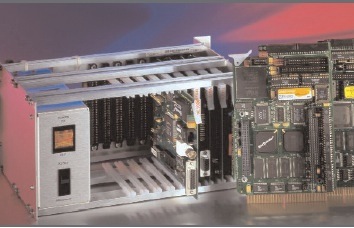Linux hops on STD bus
Nov 24, 2008 — by LinuxDevices Staff — from the LinuxDevices Archive — 36 views WinSystems announced a Linux-friendly SBC (single board computer) using the venerable STD bus. Offered as a migration path for “key industrial customers,” the fanless LPM-LX800 offers an AMD Geode LX800, up to 1GB of RAM, up to 16GB of CompactFlash, and four serial ports, says WinSystems.
WinSystems announced a Linux-friendly SBC (single board computer) using the venerable STD bus. Offered as a migration path for “key industrial customers,” the fanless LPM-LX800 offers an AMD Geode LX800, up to 1GB of RAM, up to 16GB of CompactFlash, and four serial ports, says WinSystems.
(Click here for a larger view of the WinSystems LPM-LX800)
The STD bus is an 8-bit bus with a 56-pin connector. Developed by Prolog and Mostek in 1978, it became an IEEE standard known as IEEE-961 in 1987, and is still in use today for industrial applications, according to WinSystems. Originally derived from “standard,” STD was later marketed as “Simple to Design,” “Simple to Develop,” and “Simple to Debug.” WinSystems President Jerry Winfield commented, “I designed the first three STD Bus boards for Mostek thirty years ago, and am pleased with the stability that this architecture has provided in the industrial market.”
WinSystems is pitching its new LPM-LX800 SBC as providing users of the “blue collar bus” with increased performance and assured long-term availability. The device operates fanlessly, even over its industrial operating range of -40 to 85 deg. C (-40 to 185 deg. F), WinSystems claims.
When the STD bus first made its debut, cards were lucky to be able to hold a CPU, much less a complete computer. But now, of course, a lot more can be crammed into a 7 x 4 inch footprint.

An STD bus card cage and sample boards
Source: WinSystems
As implied by its name, the LPM-LX800 employs AMD's 500MHz Geode LX800 processor, along with the chipmaker's CS5536 companion chip. This two-chip chipset uses about five Watts to deliver performance roughly equivalent to that of a Via C3 clocked at 800MHz, AMD said when it launched the chip.
A 200-pin SODIMM socket on the back of the board (not shown) lets the LPM-LX800 accept up to 1GB of DDR1 memory. Also on the rear of the board is a CompactFlash socket, said to accept up to 16GB of storage, and to be ready for the installation of Linux, Windows XP Embedded, or “other x86 RTOSes.”
The device sports a wealth of interfaces, though using any of them requires accessory cables that attach to headers on the SBC. Video outputs support simultaneous operation of CRT and flat-panel diplays, WinSystems says, with resolution up to 1920 x 1200 pixels on the former, and 1600 x 1200 on the latter. Meanwhile, there's a 10/100 Ethernet interface.
The LPM-LX800 has four RS232/422/485 serial ports, 48 lines of digial I/O, four USB ports, and a 33/66MHz UDMA IDE port, according to the company. It also features PC/104 and PC/104-Plus expansion connectors.
Finally, the RoHS-compliant board is said to have AC '97 audio capabilities, and to support AT- or PS/2-style keyboard interfaces. The device can provide power to LCD backlights, offers a custom splash screen upon startup, has a “precision power-fail reset circuit,” and includes a watchdog timer, WinSystems adds.
Features and specifications listed by WinSystems for the LPM-LX800-G include:
- Processor — AMD Geode LX800 clocked at 500MHz
- Memory — Accepts up to 1GB of DDR1 RAM via single SODIMM socket
- Display — Supports dual displays, with up to 1920 x 1200 CRT resolution, and up to 1600 x 1200 flat-panel resolution
- Networking — 10/100 Ethernet
- Other I/O (all via headers):
- 4 x USB 2.0
- 48 bidirectional digital I/o lines
- 4 x RS232/422/485
- 1 x parallel
- 1 x IDE
- AT and PS/2 keyboard interfaces
- AC '97 audio
- 4 x USB 2.0
- Operating range — -40 to 85 deg. C (-40 to 185 deg. F)
- Power — +5VDC
- Dimensions — 7 x 4.5 inches (178 x 114mm)
WinSystems maintains an interesting Blue Collar Linux software development kit (SDK) targeting industrial applications. Specific downloads offered for the LPM-LX800 include Fast Ethernet drivers for Linux 2.2, 2.4, and 2.6.
Availability
The LPM-LX800 is available now, priced at $895 in single quantities, according to WinSystems. More information may be available from the company's website, here.
This article was originally published on LinuxDevices.com and has been donated to the open source community by QuinStreet Inc. Please visit LinuxToday.com for up-to-date news and articles about Linux and open source.